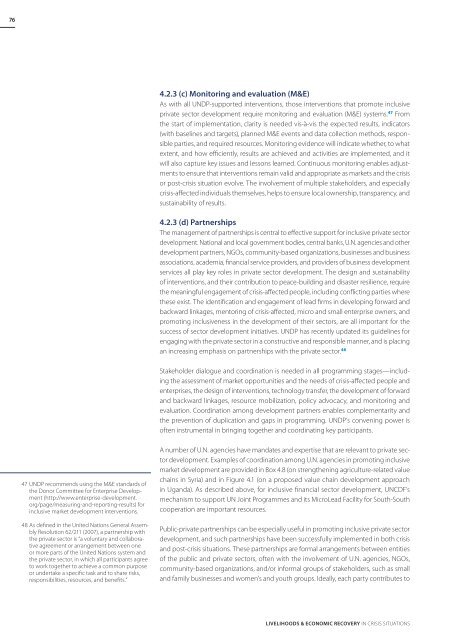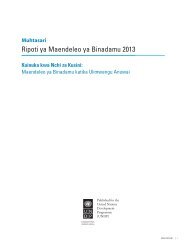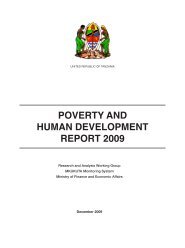Download PDF (4.08 MB) - ReliefWeb
Download PDF (4.08 MB) - ReliefWeb
Download PDF (4.08 MB) - ReliefWeb
Create successful ePaper yourself
Turn your PDF publications into a flip-book with our unique Google optimized e-Paper software.
76<br />
4.2.3 (c) Monitoring and evaluation (M&E)<br />
As with all UNDP-supported interventions, those interventions that promote inclusive<br />
private sector development require monitoring and evaluation (M&E) systems. 47 From<br />
the start of implementation, clarity is needed vis-à-vis the expected results, indicators<br />
(with baselines and targets), planned M&E events and data collection methods, responsible<br />
parties, and required resources. Monitoring evidence will indicate whether, to what<br />
extent, and how efficiently, results are achieved and activities are implemented, and it<br />
will also capture key issues and lessons learned. Continuous monitoring enables adjustments<br />
to ensure that interventions remain valid and appropriate as markets and the crisis<br />
or post-crisis situation evolve. The involvement of multiple stakeholders, and especially<br />
crisis-affected individuals themselves, helps to ensure local ownership, transparency, and<br />
sustainability of results.<br />
4.2.3 (d) Partnerships<br />
The management of partnerships is central to effective support for inclusive private sector<br />
development. National and local government bodies, central banks, U.N. agencies and other<br />
development partners, NGOs, community-based organizations, businesses and business<br />
associations, academia, financial service providers, and providers of business development<br />
services all play key roles in private sector development. The design and sustainability<br />
of interventions, and their contribution to peace-building and disaster resilience, require<br />
the meaningful engagement of crisis-affected people, including conflicting parties where<br />
these exist. The identification and engagement of lead firms in developing forward and<br />
backward linkages, mentoring of crisis-affected, micro and small enterprise owners, and<br />
promoting inclusiveness in the development of their sectors, are all important for the<br />
success of sector development initiatives. UNDP has recently updated its guidelines for<br />
engaging with the private sector in a constructive and responsible manner, and is placing<br />
an increasing emphasis on partnerships with the private sector. 48<br />
Stakeholder dialogue and coordination is needed in all programming stages—including<br />
the assessment of market opportunities and the needs of crisis-affected people and<br />
enterprises, the design of interventions, technology transfer, the development of forward<br />
and backward linkages, resource mobilization, policy advocacy, and monitoring and<br />
evaluation. Coordination among development partners enables complementarity and<br />
the prevention of duplication and gaps in programming. UNDP’s convening power is<br />
often instrumental in bringing together and coordinating key participants.<br />
47 UNDP recommends using the M&E standards of<br />
the Donor Committee for Enterprise Development<br />
(http://www.enterprise-development.<br />
org/page/measuring-and-reporting-results) for<br />
inclusive market development interventions.<br />
48 As defined in the United Nations General Assembly<br />
Resolution 62/211 (2007), a partnership with<br />
the private sector is “a voluntary and collaborative<br />
agreement or arrangement between one<br />
or more parts of the United Nations system and<br />
the private sector, in which all participants agree<br />
to work together to achieve a common purpose<br />
or undertake a specific task and to share risks,<br />
responsibilities, resources, and benefits.”<br />
A number of U.N. agencies have mandates and expertise that are relevant to private sector<br />
development. Examples of coordination among U.N. agencies in promoting inclusive<br />
market development are provided in Box 4.8 (on strengthening agriculture-related value<br />
chains in Syria) and in Figure 4.1 (on a proposed value chain development approach<br />
in Uganda). As described above, for inclusive financial sector development, UNCDF’s<br />
mechanism to support UN Joint Programmes and its MicroLead Facility for South-South<br />
cooperation are important resources.<br />
Public-private partnerships can be especially useful in promoting inclusive private sector<br />
development, and such partnerships have been successfully implemented in both crisis<br />
and post-crisis situations. These partnerships are formal arrangements between entities<br />
of the public and private sectors, often with the involvement of U.N. agencies, NGOs,<br />
community-based organizations, and/or informal groups of stakeholders, such as small<br />
and family businesses and women’s and youth groups. Ideally, each party contributes to<br />
Livelihoods & Economic Recovery in Crisis Situations





